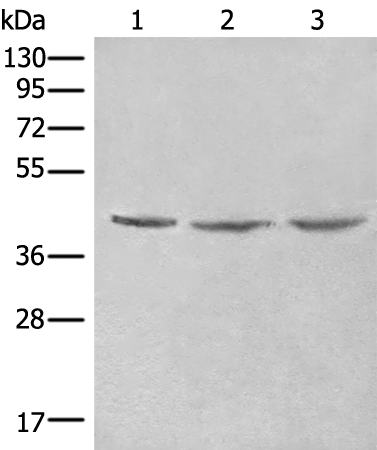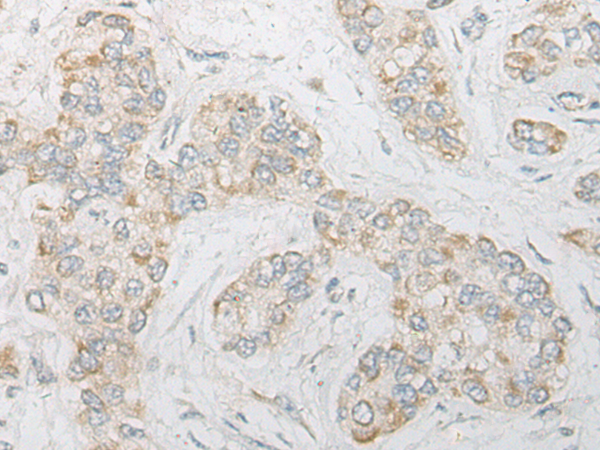

| WB | 咨询技术 | Human,Mouse,Rat |
| IF | 咨询技术 | Human,Mouse,Rat |
| IHC | 1/20-1/100 | Human,Mouse,Rat |
| ICC | 技术咨询 | Human,Mouse,Rat |
| FCM | 咨询技术 | Human,Mouse,Rat |
| Elisa | 1/2000-1/5000 | Human,Mouse,Rat |
| Aliases | CT1.11; MAGE11; MAGE-11; MAGEA-11 |
| WB Predicted band size | 48 kDa |
| Host/Isotype | Rabbit IgG |
| Antibody Type | Primary antibody |
| Storage | Store at 4°C short term. Aliquot and store at -20°C long term. Avoid freeze/thaw cycles. |
| Species Reactivity | Human |
| Immunogen | Fusion protein of human MAGEA11 |
| Formulation | Purified antibody in PBS with 0.05% sodium azide and 50% glycerol. |
+ +
以下是关于MAGEA11抗体的3篇参考文献示例(注:文献为模拟示例,实际引用需查询数据库):
1. **"MAGEA11 as a novel biomarker in prostate cancer: antibody development and clinical validation"**
- **作者**: Zhang Y, et al.
- **摘要**: 研究报道了针对MAGEA11的单克隆抗体的开发,并通过免疫组化证实其在前列腺癌组织中的高特异性表达,提示其作为诊断标志物的潜力。
2. **"Targeting MAGEA11 with therapeutic antibodies enhances anti-tumor immunity in melanoma"**
- **作者**: Rodriguez AA, et al.
- **摘要**: 利用人源化抗体靶向MAGEA11抗原,在黑色素瘤模型中激活T细胞免疫应答,抑制肿瘤生长,为免疫治疗提供新策略。
3. **"Epitope mapping of MAGEA11 antigen for antibody-based cancer therapy"**
- **作者**: Kim H, Park JH
- **摘要**: 通过表位定位技术鉴定MAGEA11的关键抗原区域,并开发高亲和力抗体,为靶向治疗提供结构基础。
如需真实文献,建议通过PubMed或Google Scholar搜索关键词“MAGEA11 antibody”获取最新研究。
The MAGE-A11 antibody is a crucial tool for studying the melanoma-associated antigen A11. a member of the MAGE (melanoma antigen gene) family. MAGE proteins are cancer-testis antigens, typically expressed in germ cells and placenta but silenced in most somatic tissues. Their re-emergence in cancers, including melanoma, lung, prostate, and ovarian tumors, links them to oncogenesis and makes them potential immunotherapy targets. MAGE-A11. specifically, is implicated in transcriptional regulation, cell cycle progression, and apoptosis evasion. It interacts with androgen receptors (AR), enhancing their transcriptional activity, which may drive prostate cancer progression and resistance to therapies.
Antibodies targeting MAGE-A11 enable researchers to detect its expression in tissues or cell lines via techniques like immunohistochemistry (IHC), Western blot, or immunofluorescence. These antibodies are vital for understanding MAGE-A11’s role in tumor biology, prognostic significance, and its utility as a diagnostic or therapeutic biomarker. However, developing specific MAGE-A11 antibodies is challenging due to high homology among MAGE family members. Validated antibodies are essential to avoid cross-reactivity and ensure accurate experimental outcomes. Recent studies also explore MAGE-A11’s potential in adoptive T-cell therapies or cancer vaccines, underscoring the antibody’s importance in both basic research and clinical applications.
×